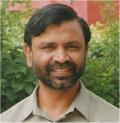The Independent Newsweekly
| National
Catholic Reporter
The Independent Newsweekly |
| Global Perspective |
| February 4, 2004 |
Vol.
1, No. 42
|

Fr. Dominic Emmanuel, a priest of the Divine Word, is the director of the communication and information bureau of the Delhi Catholic archdiocese. The Third Church has not faced the issue of homosexuality at a larger level. At least from the Asian perspective, one does not oppose homosexuality because of conservatism, but because it does not fall within the life experience of most people. |
Looking to the Global South for orthodoxyBy Dominic Emmanuel, SVD NEW DELHI -- Intense debates in the public and private spheres have been witnessed recently, all generated by the controversy born of the ordination of the Rev. Gene Robinson as a bishop in the Episcopal Church in the United States. Few might have expected such wide condemnation of the ordination from various quarters. Segments not only of the Anglican church but also the Catholic church opposed it. The controversy brought many issues to the fore, and, doubtless, helped some people clear their thinking on issues of gay relationships. Interestingly, a greater opposition to this has come from the Global South, making one wonder whether the opposition is cultural or theological. Regardless of whether it is cultural or theological, an interesting question has been raised: Should the Global North, which basically means Western churches, look toward the Global South, including to the East, for orthodoxy? Writing in Coming of the Third Church way back in 1975, Walter Bhulmann observed the shift of the center of the church from the West to Africa, Asia and Latin America, which he called the Third Church. He wrote, "… the world's center of gravity is no longer in Europe and … the Second Church [Roman] no longer constitutes the focal point of Christianity … the West has been dismissed from its post as the center of religious, cultural unity for the whole of Christianity…" From Bhulmann's thesis, one can argue the Western church should look to the Global South for orthodoxy, and not just on issues of homosexuality, but for other matters as well, including progressive theology and church practices. First of all, and this has relevance for the issue of homosexuality, the Western church could learn from the Global South's experience of family. The nurturing of family and its extended ties is a strong cultural value here. In a strong, extended family an individual finds strength and aid to bear pain and tolerate suffering (and live the paschal mystery in daily life). One does not immediately run away from pain nor look for one's individual freedom. Strong families nurture the balanced and healthy growth of an individual, and one or more members of the family are always available to support someone in moments of crisis. With this understanding of family, the Third Church has not faced the issue of homosexuality at a larger level. At least from the Asian perspective, one does not oppose homosexuality because of conservatism, but because it does not fall within the life experience of most people. The Western church could also look to the Third Church for the way it has adapted liturgies for different cultures. The Africans, for instance, have integrated tribal dances in their liturgical celebrations. Indians have been particularly adept at cultural adaptation, adopting aarti (honoring God or the priest with flowers, an oil lamp and incense sticks arranged on a steel plate) and singing bhajans (continuous recitation of the name of Jesus or the Trinity). Such cultural adaptations make the liturgy rich and meaningful for participants, lessons from which the West could learn. A third aspect of Christian life that the Western church could learn from the Third Church is how Christians, by and large, live in harmony with people of other religions. Western visitors here are often amazed that while in their own countries even good ecumenical relationships are hard to come by, many in the Third Church countries have smooth ecumenical relations, and they get along well even with people of non-Christian religions. Related to this point is Third Church people's sense of spirituality, their sense of the divine (although it can some times border on superstition). Again, Western visitors are amazed to find churches full for Sunday services, and people fasting and praying regularly because of their deep sense of the presence of God. Though no one likes to glorify poverty, the Western church, used to living in a consumer culture, could surely learn from the Third Church countries how living with wants or in poor conditions need not rob one of happiness. (Think of Jesus being born in a stable.) On the contrary, deprivations can often help one to depend more on God. All the above is not to say that the Global South has a monopoly on right thought and action. For instance, virtues such as honesty, hard work, respect for individuals and gender equality are some of the values deeply embedded in Western culture but conspicuously absent in the Global South, including in its churches. And the misuse of money; rigid caste and class systems; the treatment of women, including the demand for dowries; and the preference for male children are some of the ugly cultural practices that have crept into the churches in the Global South and need weeding out. Exchange programs between the people of the Global North and the Global South would be valuable. Such programs, no doubt, would help both sides greatly. |
| Copyright
© 2003 The National Catholic Reporter Publishing Company, 115
E. Armour Blvd., Kansas City, MO 64111
TEL: 1-816-531-0538 FAX: 1-816-968-2280 |